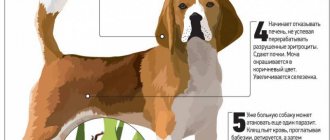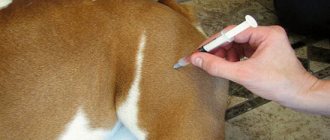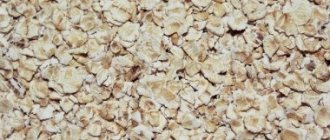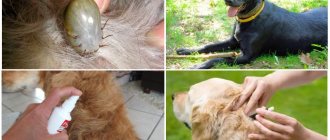Over the past 10–15 years, an allergic reaction has become one of the most common phenomena not only among people, but also among animals. We will not speculate about why this happens. We'll leave this to the experts. It seems that owners of four-legged animals are more interested in the answer to the question of what can be given to a dog for allergies. and how to relieve your pet’s suffering.
People suffering from this disease know firsthand that taking even one tablet of an antihistamine can significantly improve the patient’s condition. But not all dog owners know whether it is possible to give Suprastin to a dog with allergies. What kind of dog allergies are there and how to treat them? We will try to answer these and other questions below.
How does the immune system work?
Before we talk about what to give a dog for allergies, let's find out what happens in the body of an animal (and a person too) with such a disease.
Dogs are warm-blooded animals, quite highly developed. A distinctive feature of such organisms is the presence of immunity, which is responsible for the stability of cell composition. Immunity is not a single organ, but a whole complex that includes lymphoid tissues, the spleen, and special blood proteins. The task of the system is to analyze all cells of the body according to the “friend or foe” system. As soon as the immune system detects an “enemy”—a cell that is unusual for the human or animal body—the defense mechanism immediately turns on and the “stranger” is destroyed.
Every day, an incredible amount of different substances enter a dog’s body. This happens through food, water, air, wool and skin pores. Normally, the dog’s body does not react in any way to such penetration. Over the course of its life, a dog develops a certain “indifference” due to getting used to external stimuli. An immune response occurs only when there is a real threat of penetration of viruses and pathogens or in the event of mutation of one's own cells. The immune system no longer “recognizes” them and tries to destroy them.
Symptoms of dog allergies
What allergy pills can you give your dog? We'll talk about this a little below. Now let's look at the signs by which an attentive owner can predict the development of such a disease in his pet.
As a rule, allergic reactions in dogs are quite pronounced, and the disease itself is much more severe than in humans. For example, if in people contact with the pollen of some plants only causes sneezing, tearing and swelling of the mucous membranes, then in dogs all these signs are also accompanied by itching of the paws and skin. The animal constantly licks and bites these places, which not only provokes a new attack, but can also lead to the development of weeping ulcers.
So, your dog most likely has an allergy if he:
- chews and licks paws unreasonably often;
- constantly scratches ears;
- has redness, rashes, or open sores on the skin;
- smells bad for no apparent reason;
- often suffers from ear infections;
- rubs against furniture or rolls on the floor;
- has red spots or cracks between the fingers;
- coughs, sneezes or suffers from frequent runny nose;
- has constantly inflamed eyes;
- gums have acquired a bluish tint;
- has an unpleasant odor from the mouth;
- suffers from frequent bouts of vomiting or diarrhea.
A particularly striking picture is demonstrated by the combination of several features.
Types and symptoms of kennel cough
Classification of cough can be carried out based on different criteria:
- Duration : acute (10-12 days) and chronic (over 2 months).
- The intensity is a slight cough and with anguish.
- By “sound” – barking, hoarse, chesty, with wheezing, without sound.
The most common typology is the division of cough into dry and wet, based on the presence of discharge. Cough accompanies many illnesses. Therefore, assessment and diagnosis are carried out in the totality of all symptoms.
Common to all types of cough in dogs is the mechanism of its occurrence:
- Short inhalation, reflex contraction of the laryngeal muscles,
- Spasm of the abdominal muscles;
- Opening of the glottis;
- Exhalation.
Allergic
Allergic cough in dogs is dry. It is observed in combination with the following manifestations:
- Sneezing;
- Watery eyes, redness of the whites;
- Redness;
- Blueness of the oral mucosa;
- Allergic dermatitis - rashes, small blisters, swelling, itching.
The appearance of this species may be associated with seasonal characteristics (flowering time) or be permanent . In the second case, it is necessary to identify the allergen and eliminate it. Chemicals (household chemicals) and certain foods (food intolerance) can act as irritants.
Perhaps this is the only type of cough that does not require the use of special antitussive drugs. Treatment consists of taking antihistamines. Diagnostic methods – allergy tests. Before receiving test results, it is advisable to isolate your pet from classical pathogens - dust, plant pollen (flowering period). It is recommended to use special, hypoallergenic food.
Kennel (aviary) cough
Kennel (aviary) cough is a sure sign of acute tracheobronchitis. The disease develops when a dog is infected with the rod bacterium Bordatella bronchiseptica. The pathogen belongs to the genus whose representatives cause whooping cough in humans. Transmitted by airborne droplets. The main factors are the weakness of the dog’s immune system and genetic predisposition, including structural features of the respiratory system (narrowing of the trachea).
Main symptoms:
- Refusal to eat;
- Runny nose;
- Cough and vomiting with foam;
- Fever.
The cough with this disease is dry and sharp.
Infection is possible in places where a large number of animals are present at the same time. These are mainly open areas for walking dogs, shelters and unregistered nurseries, and veterinary clinics. It is not possible to completely exclude accidental contact with a sick animal in these cases. Signs of the disease appear within 2-3 hours after contact and last up to 2-2.5 weeks. Diagnosis comes down to therapeutic methods (listening). An x-ray may be ordered to rule out pneumonia.
For mild forms of the disease, antitussives are prescribed. When the cough becomes wet, therapy is changed to mucolytic drugs.
The severe form is accompanied by discharge from the eyes, nose and increased body temperature. Treatment is with antibiotics.
The dog is coughing as if he was choking
This symptomatology is typical for a number of cases:
- The disease described above is acute tracheobronchitis;
- Sore throats;
- Problems in the cardiovascular system;
- If a foreign body gets into the throat or trachea.
External manifestations in all situations are similar - a strong, suffocating cough. When it causes pain to the pet and is accompanied by vomiting, the dog may try to contain it. It is not recommended to use antitussives on your own (to inhibit the cough reflex). It would be correct to contact a veterinarian to determine the exact cause of the cough.
Cough when a foreign object gets into the throat
Foreign bodies are various small objects that enter the animal’s throat from the outside. These are mainly small parts of toys, bones, shoes and furniture.
In most cases, the animal, thanks to the cough reflex, gets rid of foreign objects on its own. If coughing continues or vomiting occurs, you should immediately contact a veterinarian.
It is unacceptable to remove a foreign substance at home.
Inept actions of the owner can lead to dire consequences. The object can also get stuck in the esophagus and damage it or end up in the stomach. Surgical intervention will become inevitable.
Cough with heart problems
A dry, intermittent cough is often a signal of diseases of the cardiovascular system. The heart's mitral valve is most often affected (mitral regurgitation). Deviations in the functioning of this important organ lead to the fact that blood does not enter the heart and accumulates in the atrium.
This cough has characteristic symptoms:
- General weakness, lethargy;
- Fatigue, refusal to move;
- Dyspnea;
- Blueness of the animal's gums;
- Breathing with the mouth wide open;
- The dog cannot sit.
A morning or night cough in this situation indicates the development of the disease and deterioration of the condition. The disease is typical for older dogs.
Diagnosis is carried out in a veterinary clinic using cardiac ultrasound. Additionally, an ECG is prescribed and blood pressure is measured.
Therapy consists of reducing physical activity and prescribing medications that support the functioning of the cardiovascular system.
In severe cases, surgical intervention is performed.
The second most common disease is pericarditis. This is an inflammation of the outer lining of the heart. May have an infectious or traumatic origin. Often accompanies cancer. In addition to therapy for mitral valve problems, the use of diuretics is justified. They stimulate the outflow of fluid.
Pneumonia
Pneumonia is a dangerous disease. If left untreated, it leads to the death of the pet. There are several types of this disease in dogs. Treatment depends on the type of inflammation diagnosed.
Bacterial pneumonia
The most common type of pneumonia. Caused by numerous pathogenic microbes. The pathogens infect the lung tissue, resulting in respiratory failure. The nature of the disease is acute, accompanied by a feverish state. Treatment is with antibiotics.
Fungal pneumonia
It is considered a deadly form, as it is often asymptomatic. Occurs against the background of hypothermia and weakened immunity. May develop as a result of long-term use of antibiotics. Antifungal drugs are used for treatment.
Aspiration pneumonia
Toxic damage to lung tissue as a result of foreign liquids (usually vomit) and objects entering the respiratory tract (lower section). Treatment consists of removal of the foreign body followed by oxygen therapy to the lungs.
The main diagnostic methods are x-ray examination, serological sputum analysis, blood test.
Regardless of the variety, there are general signs that suggest the presence of pneumonia in a pet:
- Wet, gurgling cough with sputum;
- Decreased appetite, sudden weight loss;
- Fever, increased body temperature;
- General weakness.
Cough due to infectious diseases
Cough also accompanies some infectious diseases in dogs. Among the most common is tonsillitis (acute tonsillitis). The source of infection are staphylococci and streptococci. The disease affects the tonsils.
The clinical picture is clearly expressed:
- Dry, frequent cough; the dog coughs as if he was choking;
- A sharp increase in body temperature;
- Enlarged tonsils with the appearance of purulent plaque;
- Refusal of solid food;
- Rotten smell from the mouth.
Diagnosis is carried out by external examination of the oral cavity. Treatment is with antibiotics.
Snot and cough
The simultaneous presence of a cough and runny nose in an animal most likely indicates that the dog has a cold. In the vast majority of cases, the disease occurs against a background of reduced immunity. Symptoms: dry nose, red eyes, snot, dry cough.
If your body temperature does not rise, you can cope with the cold on your own. To do this, the pet must be given plenty of fluids, placed in a warm, well-ventilated room, and started taking immunomodulatory medications. If your temperature rises sharply, a wet cough appears and you refuse to eat, you should not delay visiting a doctor. This could be life-threatening pneumonia.
Preventive measures boil down to organizing a vitamin-rich diet and proper care (keep in cool, ventilated places, regular cleaning of eyes, ears, paws).
Dry cough
A dry cough goes away without sputum production. It is diagnosed in most diseases and is localized in the upper part of the respiratory tract.
The main symptoms and manifestations are decreased activity, wheezing, whistling, vomiting. It is especially dangerous because it can be a sign of a serious illness and requires immediate attention to a veterinarian.
There is a temperature
A fever with a dry cough indicates a bacterial infection and requires contacting a veterinarian. Treatment is with antibiotics.
No temperature
If there is no temperature, it may be due to the dry air in the room where the dog is. In this case, humidifiers and frequent ventilation will help.
Moist cough
A wet cough usually accompanies diseases of the respiratory system. Most often we are talking about pneumonia. The formation of this form occurs at the level of the chest.
The sound is dull, gurgling. The presence of a wet cough in a dog indicates a long course of the disease. In the absence of timely treatment, it can lead to the death of the pet.
With phlegm and mucus
A cough with phlegm and mucus is a definite sign of pneumonia . The pet must be immediately admitted to a hospital for a medical examination and appropriate treatment.
With pus
A dog coughing up pus also indicates pneumonia and requires immediate response from the owner. The sooner the animal starts taking antibiotics, the higher the chances of a successful recovery.
With blood
Bloody impurities in the sputum, released when coughing, indicate an advanced state of the disease. The owner's actions in such cases are similar to those described above. Coughing up blood is often present in cancer patients.
With white foam
A cough with white foam most often occurs in three situations:
- When a dog is infected with acute tracheobronchitis (kennel cough);
- If a foreign body enters the larynx;
- For heart failure.
Antiparasitic drugs
Many experienced breeders know that a common cause of coughing in dogs is... helminths. Their larval forms spend about two weeks in the animal's lungs, causing inflammatory reactions. In these cases, both the above-described antibacterial agents and antiparasitic drugs are prescribed. We will list only a few, since these funds are many times larger:
- Prazitel (especially convenient in suspension form). It is given in a dose of 1 ml for every kilogram of a puppy’s weight or a milliliter for every 10 kg of live weight of an adult dog.
- Milbemax. Depending on the weight of the pet, give from ½ tablet to three tablets. One time. If necessary, the treatment is repeated after 10 days.
- Kanikquantel Plus. Give one tablet for every 10 kg of live weight.
In addition, there are dozens of other types of drugs, so it makes no sense to describe them all.
Laryngitis
When the mucous membrane of the larynx becomes inflamed, the animal suffers from a strong and painful cough. At the beginning of the disease it is dry and sharp, “barking”. Afterwards the cough becomes wet, prolonged and painless. The causes of laryngitis are hypothermia or drinking excessively cold water. There is little sputum produced and it is usually transparent; when the dog feels its throat, it shows a painful reaction.
In the treatment of laryngitis, it is important to keep your pet warm and moderately humid, and give only warm food and water. You can add lemon juice to the water - this will soften the throat and reduce pain. It is better to create a diet from wet or crushed food. It is advisable to wrap the dog's neck with a warm woolen scarf. You can take medicinal decoctions of coltsfoot, chamomile, rosehip or sage inside 3-4 times a day.
Antibiotics are prescribed (falimint, biseptol, penicillin or chloramphenicol). At the onset of the disease, antitussives are given; for wet coughs, steam inhalations with expectorants are effective. If laryngitis is of an allergic nature, anti-allergenic drugs are prescribed - diphenhydramine, tavegil or suprastin.
Antibiotics (the list is far from complete and is presented for informational purposes only!)
| Dose | A course of treatment | ||
| Penicillin | Intramuscular or intravenous | 10-30 units/kg, with intravenous administration the dose is 2 times less. | It is important to dilute with novocaine. Frequency – 4-6 times/day, minimum 4-7 days. |
| Biseptol | inside | 10 mg/kg for small and medium-sized dogs, 30 mg/kg for large dogs. The first time a double dose is usually given. | 2 times a day for 7-14 days. It is better and more convenient to give in the form of a suspension. |
| Amoxiclav | inside | 12.5 mg/kg | Twice a day for at least 7 days. Extension of the course of treatment at the discretion of the attending physician |
Antitussives | |||
| Mukaltin | inside | 1-2 tablets | Crushed tablets are mixed with water and poured into the mouth 3 times a day for no longer than 3 days. May cause severe salivation due to the specific taste. |
| Bromhexine | Orally in tablets or into a muscle in solution | 2 mg/kg | Twice a day at equal intervals. Duration – no more than 7 days. |
ExpectorantsAntihistamines | |||
| Loratadine | inside | 0.5-0.7 mg/kg (1 tablet/15-20 kg) | 2 times a day for at least 2 weeks, because... Almost all drugs have a cumulative effect. The duration of treatment can be increased at the discretion of the veterinarian. Outside of food. |
| Tavegil | inside | 0.02 mg/kg | |
| Allervet 1% | Intramuscular or subcutaneous | 0.2-0.4 ml/kg | Up to 4 times/day. It is forbidden to combine with drugs that have an effect on the central nervous system (sedatives of various groups). |
First aid
The first thing every owner should do when detecting any of the listed signs is to take their pet to the veterinarian. It is the doctor who must make the correct diagnosis and determine which tablets to give the dog for allergies. But until the legs, or rather, paws, reach the clinic, you can try to alleviate the animal’s suffering yourself.
Before thinking about whether it is possible to give Suprastin to a dog with allergies and whether this should be done without consulting a doctor, try to immediately stop the action of the allergen. This is, of course, very difficult to do. After all, a dog is not a person and cannot tell you that its eyes itched after it sniffed some bush. So “immediately” in this case can stretch over a long period.
If mild symptoms occur, you can use the already mentioned Suprastin. If the course of the disease is severe, you cannot do without injections of this drug. They are most often done at the withers or hind thigh.
If you are not sure how much Suprastin to give to a dog with allergies, carefully read the instructions for the drug. In this case, you need to focus not on the age, but on the patient’s weight. You can weigh your pet and decide on the dose of the drug yourself. However, we must remember that it is better to “under-deliver” than to “over-deliver.” An overdose may not only not alleviate the animal’s suffering, but also worsen its condition.
It is also useful to give your dog calcium chloride. 1–5 tablespoons per day is enough. It all depends on the size of the animal. Unfortunately, this medicine is very bitter. Therefore, to ensure that the dog does not refuse to take the medicine, it can be diluted with milk and a little sugar added. This cocktail is most often to their taste.
If there are manifestations on the skin, you should bathe your pet in a decoction of the string or wipe the itchy areas with a swab dipped in the infusion.
A regular hydrocortisone spray perfectly relieves itching. You can easily do it yourself. To do this, mix the following components:
- hydrocortisone - 4 ampoules;
- cold boiled water - 350 ml;
- medical alcohol - 80 ml;
- glycerin - 50 ml.
Some owners are interested in the question of whether it is possible to give their dog Loratadine for allergies if there are no other drugs at hand. In principle, it will not make your pet worse. But whether relief will come depends on what exactly the animal is suffering from. Loratadine works well when a dog reacts to pollen or house dust particles. But for food manifestations it is practically useless.
How to help a dog with a coughing attack
If the attack lasts and suffocation occurs, urgent assistance will be required. If you do not have the opportunity to go to a veterinary clinic, use the following recommendations:
- Pinch your pet's nose and gently run your palm over his throat. This is effective for reverse sneezing syndrome.
- Turn the dog onto his back so that his body and paws are higher than his head. Gently shake him and pat him on the back. If the animal is too big, lift its hind legs and pat its chest.
- Check the larynx and free it from foreign objects.
- Provide oxygen supply and perform cardiac massage. For this:
- place your pet sideways on a flat surface;
- open his nostrils and breathe air into them with your mouth;
- place your hands on the animal’s ribs behind the elbows and press on them every 5 seconds;
- continue to repeat the steps for at least 10 minutes;
- after the mucous membranes turn pink and the heart function stabilizes, call a veterinarian;
- do not move the dog and monitor its condition until the doctors arrive.
The depth and duration of inhalations through the nose depends on the size of the animal. The larger the pet, the deeper and longer the breaths should be. Regardless of the recommendation you choose, contact your veterinarian. After suffocation occurs, diagnosis is mandatory.
General information
How do allergies manifest in dogs?
Most often it is itching (the dog is constantly itching, often in the same place, biting itself). Scratching appears on the skin. Hair begins to fall out in the area of injured skin. Another main sign is a rash. The rash can be varied. Small protruding dots and blisters similar to those left by nettles are called urticaria. If your pet also has swelling, this means that the reaction is quite serious.
The most severe and deadly reaction is anaphylactic shock. Fortunately, it happens quite rarely. This is a sudden, rapidly developing condition, when skin manifestations may not have time to appear at all, and the main symptoms will be swelling, the face and throat often swell, difficulty breathing, bronchospasm. In such a situation, only immediate administration of hormonal drugs will help. If your pet is prone to allergies, check with your doctor about what to do in such situations.
There are two more severe manifestations of allergies that are systemic in nature. That is, the manifestations are not only on the skin, the whole body suffers. These are bronchial asthma and atopic dermatitis. In any case, you need to contact a veterinarian.
Why do allergies occur?
The main cause of this disease is food. Food allergies in dogs occur to different foods. Mostly hazardous products include canned food, dyes, sweets, baked goods, and smoked products. Please note: Owners often ignore prohibitions on such food.
Among the permitted foods, chicken is rich in allergens (often careless manufacturers stuff chicken with additives no worse than canned food), eggs, fish and seafood, milk and dairy products, and butter. Sometimes there are rashes on some fruits and vegetables. Sometimes there are allergies to food. The second common cause is parasites and insect bites. Fleas, specifically flea saliva, cause the rash.
Finding out about the presence of fleas is quite simple; look for them on the dog’s fur. If there are a lot of them you will see them right away. If the pests have just appeared and have not had time to breed, you can see indirect signs of the presence of fleas. The pet's behavior changes, it suddenly jumps up, bites itself, squeals, and general anxiety increases.
Carefully examine the frequent habitats of insects - the neck, ears, armpits; you can see not only the parasite, but also their eggs (nits) on the fur. If your pet is allergic to fleas, even one bite can trigger a skin reaction; in the worst case, it can develop into a chronic process in the form of atopic dermatitis. In this case, much more effort and time will be spent on treatment.
Helminths - these parasites live in the intestines, and allergies can manifest themselves in various disorders of the gastrointestinal tract (diarrhea, abdominal pain, vomiting). Bites of bees, wasps, hornets and some other insects cause an acute allergic reaction in the form of swelling of the bite site. It is necessary to protect the dog from them. Attention: The disease is easier to prevent than to treat. Provide your pets with flea repellents and treat them regularly. The third group of reasons includes everything else, these are vitamins, hygiene products (shampoos, soap), household chemicals, artificial fabrics.
When the first signs appear, begin to carefully monitor the animal; with repeated contact with the allergen, the disease will progress. You will help the doctor determine the root cause and prescribe the correct treatment.
Treating a dog's cough at home
If dangerous pathologies have not been identified, the veterinarian may recommend changing the pet’s diet and transferring it to new, more suitable conditions.
The owner is obliged to provide the dog with constant access to drink, a warm room and humid air. If your dog continues to cough after this, you should contact your veterinarian again.
The dog must have constant access to drink.
Treatment of aviary cough
Your veterinarian may prescribe the following:
- Antibiotic drugs.
- Expectorant drugs.
- Antitussive medications.
But it is also necessary to carry out timely vaccination against respiratory adenovirus infection.
If the animal has already suffered from kennel cough, it is necessary to take an x-ray of the sternum.
This is necessary in order to stop the development of dangerous complications. Sizomycin, Cephalosporin, Bicillin is prescribed . Sometimes the drugs are administered intravenously.
Bicillin is a drug for the treatment of aviary cough.
If a foreign object hits
Therapy consists of removing the foreign object. In some cases, this requires surgery.
If a foreign object gets in, it should be removed from the mouth.
If you suspect penetration of a foreign object, you should not give your dog laxatives. This can only make the situation worse.
Treatment of parasitic cough
The activity of parasites contributes to damage to the dog’s vital organs. Treatment consists of following preventive recommendations.
A puppy taken from a kennel must be checked for parasites. If necessary, appropriate tests are prescribed.
It is advisable to check a puppy from a kennel for the presence of worms.
Treatment of cancer and allergic cough
If the cough is caused by cancer, the animal is prescribed the following:
- Steroid drugs.
- Bronchodilator medications.
- Bronchodilators.
Allergic cough is eliminated with antihistamines . The use of Diprazine, Dexamethasone, and Calcium Chloride is prescribed. And it is also necessary to find and remove the irritant.
The drug Dexamethasone is prescribed for allergic cough.
How to treat?
A sick animal can also be prescribed the following:
- expectorants;
- vitamins A;
- vitamins C;
- vitamins E;
- Echinacea.
The use of expectorant drugs is accompanied by the rapid removal of sputum from the lungs.
By taking vitamins, the immune system is restored. Echinacea has strong antiviral and antibacterial effects. Its use helps strengthen the body's defenses.
Echinacea is an antiviral agent.
If the dog weighs less than 10 kilograms, then you need to take the medicine 7 drops twice/24 hours. If the dog weighs more than 10 kg - 15 drops twice/24 hours.
Food intolerance
What do you give dogs for food allergies? Most often, treatment includes 3 areas:
- antihistamines;
- antifungal agents and antibiotics in the presence of complications;
- special hypoallergenic diet.
What can be given to a dog for allergies should only be decided by a doctor in each individual case. And your pet faces a long treatment process. To determine the allergen, the animal is put on a strict diet, which lasts until the symptoms are completely eliminated. After this, they begin to slowly add one product at a time from their usual diet. As soon as symptoms appear again, the product is added to the prohibited list, and everything starts all over again. Each new product is added every 3-5 days, so the process can take a long time.
Medicines taken without following a diet can only temporarily alleviate the symptoms of the disease.
Is it possible to give a dog a zodak?
FAQ
“- Hello, I want to know if I can only take a test to check for allergies to cats without making an appointment with a doctor? If so, what is the minimum and maximum range of such tests performed for cats?” (June 2, 2021)
Good afternoon, yes, you can only get tested without seeing a doctor. The cost of determining IgE specific to a cat allergen using the ImmunoCAP100 device (quantitatively) is 850 rubles. + blood sampling 150 rub. It is necessary to take it on an empty stomach from 8 to 11 on weekdays, 9-11 on Sat in any of our branches. Best regards, administrator Svetlana
" - Hello. We would like to come to you to examine children aged 1.5 years and 7 years. The question is, is there only one test to detect allergies, or do you need to take a test for something specific? And also, how long will it take for the results to be ready, and is it possible to receive the results with recommendations by email?” (May 13, 2021)
The range of tests for identifying allergies is very wide (there are separate tests for food allergies, pollen allergies, animal allergies, etc.
FAQ
“- Hello, I want to know if I can only take a test to check for allergies to cats without making an appointment with a doctor? If so, what is the minimum and maximum range of such tests performed for cats?” (June 2, 2021)
Good afternoon, yes, you can only get tested without seeing a doctor. The cost of determining IgE specific to a cat allergen using the ImmunoCAP100 device (quantitatively) is 850 rubles. + blood sampling 150 rub. It is necessary to take it on an empty stomach from 8 to 11 on weekdays, 9-11 on Sat in any of our branches. Best regards, administrator Svetlana
" - Hello. We would like to come to you to examine children aged 1.5 years and 7 years. The question is, is there only one test to detect allergies, or do you need to take a test for something specific?
Source
Skin allergies
Now let's talk about what to give dogs for allergies that are not caused by food. One of the most “popular” diseases is allergic dermatitis. This is an abnormal reaction of the dog's body to external stimuli. They can be:
- organic components of dust (small dust mites, pieces of human skin, dandruff);
- particles of fur from other animals;
- synthetics (carpet, dog wardrobe, curtains);
- household chemicals;
- dog cosmetics, perfumes;
- other irritants.
Most often, younger individuals are susceptible to allergic dermatitis. The sudden appearance of such a disease in an adult dog may be a sign of developing cancer or an autoimmune disease.
Despite the fact that allergic dermatitis is a very “eloquent” disease (all the main symptoms are mainly presented on the animal’s skin), it is worth conducting additional research to rule out more serious illnesses. Similar manifestations may occur:
- infection of an animal with worms;
- renal failure;
- scabies;
- mycotic lesions of animal skin;
- diabetes;
- numerous insect bites.
To rule out these diseases, you need to take blood, feces and urine tests, as well as scrapings from your pet’s skin. Only after this can you talk with confidence about what medicine to give your dog for allergies (if that’s what it is).
Treatment of allergic dermatitis is a slow process. First of all you need:
- limit the dog’s contact with the source of trouble as much as possible;
- provide the animal with plenty of fluids;
- start using glucocorticosteroids and antihistamines;
- carry out local treatment using wound healing and anti-inflammatory drugs.
Although the first signs of relief may appear within a few days, treatment should not be stopped until symptoms have completely disappeared. Complex therapy can last up to six months.
Cough when a foreign body enters the respiratory tract
As a rule, if a dog chokes or swallows something extra, it copes with the situation on its own by coughing up. At such a moment, the cough begins suddenly, sharply, accompanied by corresponding movements of the neck and head, and a characteristic posture.
There may be another situation: the animal choked on a sharp bone, an object that, due to its shape or size, got caught in the mucous membrane. Then the following symptoms may appear:
- cough in fits and starts, prolonged, debilitating;
- during the cough reflex, the pet tries to push the foreign body out of the throat;
- wheezing;
- difficulty breathing;
- foam from nostrils;
- cough with blood, foam;
- refusal to drink and eat.
You cannot hope that the dog will cope on its own. Trying to pull out (or even see) what got into her throat is almost impossible without special tools. The animal needs to be taken to the clinic urgently. Delay threatens the development of emphysema, inflammatory processes in the bronchi, lungs, pleura and other complications.
can a dog have a zodiac
Instructions for Zyrtec for children
Contraindications to the drug indicate that Zyrtec should not be prescribed to children under six months of age. But pediatricians often prescribe it for younger children as well - they simply reduce the dosage. So, children from 6 months to a year are prescribed 2.5 mg (5 drops) 1 time per day; from 1 year to 2 years - 2.5 mg (5 drops) 2 times a day; from 2 to 6 years - 2.5 mg (5 drops) 2 times a day or 5 mg (10 drops) 1 time a day. Children over 6 years old are prescribed 10 mg (1 tablet or 20 drops) per day. Despite the fact that Zyrtec drops are very popular among pediatricians, you should be careful when using it in children. Firstly, Zyrtek does not cure, but only relieves symptoms and alleviates the child’s condition. And for the sake of fairness, it should be noted that not in all cases - many parents note its ineffectiveness. And secondly, Cetirizine has too many side effects, including allergic reactions, which it should actually stop.
Disturbances in the functioning of the immune system often lead to the development of allergic reactions, which occur in people of all ages and significantly worsen a person’s quality of life. The pharmacological market provides a huge number of drugs for the treatment of allergies, all of them are produced by domestic or foreign manufacturers. A common remedy for alleviating allergy symptoms is Zodak, which is intended for adults and children with hypersensitivity to various allergens.
Zodak is a highly effective drug for the treatment and relief of allergy symptoms of various etiologies. Before taking this product, you should read the description or consult an allergist.
The active ingredient of the drug is cetirizine dihydrochloride, which
Source
Cough in small breed dogs
In addition to brachycephalics, small breed dogs are also at risk. The specific structure of their respiratory tract increases vulnerability to dental diseases and various infections. The low location of the tonsils leads to a strong narrowing of the larynx when they become inflamed. This is accompanied by shortness of breath and difficulty breathing.
If the tonsils are often inflamed, it is recommended to remove them. For prevention purposes, veterinarians recommend paying special attention to oral hygiene and visiting the dentist at least 2 times a year.
Reactions to vaccinations and medications
Every dog needs medication at least once in its life. Sometimes, after treatment for the underlying disease, the animal exhibits side effects in the form of a so-called drug allergy. This term refers to intolerance to one or more components of a particular drug. In such cases, there is nothing left to do but give Suprastin. Other medications can be prescribed for dogs with allergies, but this one remains the most popular.
To keep your animal as safe as possible, when treating you should be careful with such groups of drugs as:
- live vaccines;
- quinine;
- chloral hydrate;
- morphine;
- B vitamins;
- serums;
- novocaine;
- sulfonamides;
- barbiturates;
- antibiotics;
- foxglove, as well as its derivatives;
- amidopyrine.
Sometimes a negative reaction does not appear in an animal immediately, but as the drug accumulates in the body. The obvious signs are:
- skin reactions;
- signs of suffocation;
- swelling of the mucous membranes;
- intestinal disorder.
It all depends on what drug to give the dog. In this case, allergies will be completely eliminated only by immediate discontinuation of the inappropriate drug. All other measures will give only a temporary effect.
What are the causes of cough
Why does the dog cough? Most breeders mistakenly believe that coughing in dogs is nothing more than a common cold. But this is fundamentally not true, and one should not attribute the pet’s poor health to this reason.
As practice shows, there can be a lot of reasons, all of them are discussed below:
- sometimes this may be a feature of a particular breed;
- tonsillitis;
- diseases of the oral cavity;
- viral tracheobronchitis;
- diseases of gums and teeth;
- spread of parasitic organisms;
- collapse of the trachea;
- tumor in the lungs;
- heart disease;
- an allergic reaction to something.
Viral cough
One of the most common reasons why a pet may cough is a viral cough. Typically, this disease manifests itself in the form of aviary cough or tracheobronchitis. As practice shows, infection is transmitted quite quickly as a result of contact with an infected pet. It only takes a minute of contact for your pet to get sick.
At the very early stage, the dog will cough, as if he is trying to burp something. After some time, the pet vomits white foam. The first thing you should do is take your pet to a specialist; subsequent treatment is carried out only after a complete examination of the patient by a doctor.
- At home, dry cough in pets is treated with antibiotics;
- an animal's irritated trachea can be treated with special anti-cough medications;
- if the dog wheezes and vomits white foam, treatment can be carried out using medications prescribed by a doctor;
- when your pet loses its appetite and refuses food, prevent contact with other pets;
- for enlarged tonsils, doctors usually prescribe the use of expectorants (video author - Ludmila Podgaevskaya).
Mechanical damage and foreign bodies
It often happens that the pet not only coughs, but also wheezes, and blood comes out of the mouth. Apparently, in this case the cause is the presence of a foreign object in the body. All breeders know that animals often swallow various things, but they are usually digested in the stomach. So, if a dog wheezes and blood comes out of his mouth, then this happens quite rarely. The cause may be damage to the central nervous system or rapid swallowing of food, which is especially important for pets of small breeds.
A similar cough may also occur as a result of collar strangulation. In addition, the cause may be a tumor or the presence of fluid in the respiratory tract. One way or another, the only thing you need to do is seek help from a specialist.
The main symptoms are as follows:
- the dog may try to burp;
- the dog wheezes, vomits, sometimes foam;
- the animal sneezes;
- saliva and blood are released from the mouth;
- the dog does not want to eat or drink;
- foam may come out of the nose (video author - dog-channel.tv).
Allergic cough
In both a puppy and an adult, coughing sometimes appears only at certain times of the year. If this is the case, then most likely your pet simply has an allergy. However, the cause of the appearance of the symptom can also be the animal’s reaction to the bites of various insects. In addition, the cause of an allergic cough may well be dust or certain substances in the diet.
Just giving a dog or puppy a drug to relieve allergy symptoms is not an option. In order for the treatment to be most effective, it is first necessary to find out why the allergy appeared. Of course, this is difficult to do at home. If your pet is allergic to food, then this can be understood by changing the diet. However, only an examination by a veterinarian will allow you to quickly obtain a more accurate result.
The main symptoms of an allergic cough are given below:
- a puppy or adult dog begins to tear;
- the animal's eyes may turn red;
- the animal sneezes;
- sometimes an allergic reaction manifests itself in the form of skin rashes.
Cough caused by parasites
The more serious problem in this case is parasites. As practice shows, infection of a pet’s body with parasites usually occurs when an adult or puppy lives in unsanitary conditions. In particular, we are talking about parasites such as hookworms and toxocaras. The process of infection by a harmful organism begins at the moment when a pet accidentally swallows a larva or parasite.
The parasite enters the lungs through the bloodstream. Excessive presence of parasites in the animal’s body can cause tracheobronchitis, as well as other inflammatory processes. Dirofilariasis is caused by a helminth that enters the bloodstream through a mosquito bite. It is always better to carry out prevention than to treat later.
The symptoms of cough caused by parasitic organisms are given below:
- when the dog lies down, the cough will intensify;
- the dog begins to lose weight sharply;
- the dog gets tired quickly;
- the pet swallows with difficulty or cannot do it at all;
- if the parasite is cardiac, then the animal may experience convulsions, as well as photophobia;
- the overall appearance of the animal deteriorates.
Toxacara parasite
"Cardiac" cough
Cardiac cough in dogs occurs due to damage to the cardiac mitral valve. Because of this disease, fluid begins to collect in the pet’s lungs, which puts very strong pressure on the trachea. In addition, cardiac cough may occur as a result of dilated cardiomyopathy, which is characteristic of large varieties. If you are the owner of a puppy or small dog weighing up to 7 kg, the likelihood of such a disease is extremely low.
The main symptoms are given below:
- fluid began to accumulate in the abdominal cavity;
- the gums have acquired a bluish-gray tint;
- the animal's activity has decreased significantly;
- the dog wheezes and develops a dull cough;
- the intensity increases (video author - Ludmila Podgaevskaya).
Cough due to cancer
Sometimes the problem can manifest itself as a result of the pet developing cancer. As a rule, in this case the breed does not play a role; the problem usually manifests itself in older age. There can be several types of tumor, and treatment options depend on this. For example, if your dog has a primary or secondary tumor, it may feel better if you give him steroids. In any case, you should not give any medications yourself without a doctor’s prescription.
How to treat a cough in a dog if the cause is type 1 adenocarcinoma:
- when activity and mobility decrease, veterinarians usually prescribe bronchodilators;
- if the animal exhibits shortness of breath, then steroids can help solve the problem;
- For arrhythmia, the optimal treatment option is bronchodilator drugs.
Allergy to bites
Now let's talk about what dogs are given for allergies to skin parasite bites. Since flea dermatitis manifests itself primarily as unbearable itching, you are unlikely to be able to do without antihistamines. In addition to Suprastin, which we have already discussed, the following drugs are most often prescribed to dogs:
- "Diazolin".
- "Allevert."
- "Loratadine."
- Zyrtec.
- "Fenistil".
- Other drugs.
In addition, it is imperative to treat the skin. This will help relieve itching and heal wounds.
All these measures will be practically useless if the main cause of the disease - fleas and ticks - is not eliminated.
Chemical allergy
Is it possible to give dogs anti-allergy pills if they are caused by household chemicals or dog cosmetics? It is possible, and even necessary. It is better to entrust the selection of the right drug to a doctor. In this case it is extremely important. After all, the combination of different chemicals (the source of the allergy and the pill) in the dog’s body can cause an uncontrollable reaction. The consequences can be dire.
What is the most common food given to dogs for allergies? The treatment package may look something like this:
- Antihistamines (most often Suprastin).
- Homeopathic medicines such as Nux, Engistol, Traumeel, Gommacord and others.
- Preparations containing sufficient doses of iron, enzymes and coenzyme Q10.
- Fish oil, vitamins E and C.
- Complex of bifidobacteria, for example, “Lactobifid”.
- Veterinary preparation of sulfur.
- A medicine to remove toxins from the body. For example, Enterosgel.
- Exekan sugar. This drug contains a complex that relieves inflammation and supports liver function.
- Other drugs.
Of course, this list is absolutely not a recipe or guide to action. Only a qualified veterinarian can tell you exactly what to give your dog for allergies in each specific situation.
Fighting heart cough
In older dogs, a common cause of gurgling and persistent coughing is heart problems. If blood does not circulate normally in the pulmonary circulation, pulmonary edema is possible, accompanied by exudate.
To reduce the likelihood of such pathologies and make it easier for your pet to breathe, he is prescribed medications that prevent the development of swelling. And most often these are banal diuretics (medicines that increase urination):
- Torsemide. Dose – from 0.5 to 1 mg per kilogram of dog weight. In addition, Furosemide, which is a complete analogue of this medicine, can be used for the same purposes.
- Hydrochlorothiazide. Dose – from 1 to 2 mg per kilogram of weight.
Important! All diuretics promote accelerated excretion of potassium from the body. This must be compensated for by prescribing multivitamin formulations and nutritional supplements. Otherwise, heart problems may only get worse.
Environmental allergies
This term refers to an atypical reaction to certain environmental factors. Allergens in this case can be various plants or their pollen, mold, dust, and other substances. Its manifestation, such as atopy, is especially unpleasant. With atopic allergies, the irritant enters the dog's body through the air. That is, she just inhales it. If in other cases it is enough to simply eliminate the source of trouble for recovery, then in the case of atopy it is almost impossible to do this. Why? Let's think about it.
If you are allergic to chocolate, the easiest way is to simply not eat it. After some time, the allergy will disappear. Now let’s imagine that the irritant is household dust floating in the air. Can you stop breathing completely to prevent the allergen from entering your body? I think no. In this case, only timely use of medications can alleviate the patient’s condition. For example, Cetrin helps people in this case.
Is it possible to give a dog Cetrin for allergies? In principle, this drug is not intended for animals. The fact is that dogs have much more sensitive receptors located on the bronchi. The use of this drug may cause bronchial spasm in the animal, often leading to suffocation. But if the manifestations of the disease are too strong, and nothing else is at hand, you can use this drug. In any case, even for very large dogs, the dose should not exceed half a tablet per day.
Attention! If the animal has a respiratory tract disease or impaired renal function, the drug is strictly prohibited!
What are the symptoms?
If your dog is coughing as if he is choking, then first you need to understand the symptoms. When pets of large or small breeds cough heavily and constantly, spit up drool, foam and grunt, this may indicate serious illness. Experts identify several signs that are considered evidence of certain problems.
Therefore, before giving your pet any medications, you should diagnose his health condition and pay attention to the accompanying symptoms:
- if a dog burps, mucus may come out of his nose at the same time;
- cough in dogs may be accompanied by weight loss;
- the dog stops being active as before, he becomes lethargic and even depressed;
- during active activities and exercise, your pet breathes evenly;
- foam may come from the mouth, the pet may vomit;
- if the dog is in a lying position, his breathing quickens;
- the pet wheezes and sneezes.
If the dog coughs as if choking, wheezes, sneezes, or vomits white foam, then it urgently needs to be taken to the veterinarian. The owner should first of all pay attention to the condition of the pet’s gums; perhaps they are bleeding, ulcers have appeared on them, or they have turned pale. Often, coughing in dogs occurs in parallel with an increased temperature. And if the dog wheezes and sneezes, you should also check the lymph nodes, they may be enlarged.
In addition, the breed of the pet, as well as its age, play an important role in this case. As practice shows, pets of certain breeds are sometimes prone to certain diseases.
Peculiarities
Zodak is a relatively safe drug for animals. It has virtually no side effects and is well tolerated by the body. But still, in some cases, the medicine must be used with extreme caution:
- If your pet has diseased kidneys, you need to monitor the dog’s condition and the body’s reaction after administration.
- Caution should be exercised when giving medication to dogs with chronic illnesses. During the examination, the attending physician must be told about the presence of such.
- For older pets, a minimum dosage is prescribed, since a large amount of the active substance in the body can negatively affect its well-being.
- If after several doses the medicine does not work, it is necessary to choose another treatment.
- With an aggressive form of allergy, Zodak may not be very effective.
In cases of violation of the recommendations for the use of the drug, an overdose may occur, which is manifested by the following symptoms:
- motor excitement;
- convulsions;
- dilated pupils;
- dry mouth;
- anxiety;
- lack of coordination;
- infrequent urination.
If your pet shows signs of overdose, you must stop taking the drug. It is also recommended to rinse the stomach or give a sorbent in order to speed up the removal of drugs from the body.
Mechanical damage and foreign bodies
Outside, while exploring the surrounding area, the dog may inhale something, such as a piece of paper or a small stone. An unknown object can damage the mucous membrane, which will cause, at a minimum, discomfort for the dog.
The cat is coughing: why it wheezes, the reasons, as if it was choking
The following symptoms are possible:
- the animal begins to breathe through its mouth and keeps it constantly open;
- the dog begins to cough in fits and starts, as if he is trying to burp something;
- the dog constantly sniffs and touches it with its paws;
- blood appears in saliva.
The animal may also refuse food and food. Foam sometimes comes out of the nose.
If grunting sounds appeared precisely after a walk, then a foreign body is the first thing to think about when looking for the cause of the ailment.
Important! You should not try to remove the object yourself; you can push it deeper, which will cause breathing problems or may scratch the mucous membrane. It is better to trust the professionals and take the animal to the veterinary clinic.
Dog at the vet
Prevention
As you know, any disease is much easier to prevent than to cure. This is especially true for allergies. The health of any four-legged animal most often depends solely on the care of the owner.
To minimize the risk of allergic reactions, from the first days of your dog’s life you should follow simple recommendations:
- avoid eating potentially allergenic foods;
- regardless of the presence of worms, regularly carry out preventive measures related to their destruction;
- use only hypoallergenic dog cosmetics, do not use “human” products in grooming;
- do not feed the animal from your table, especially “snacks”, for example, smoked meats;
- Inspect your dog’s ears as often as possible and clean them as needed;
- use as few household chemicals as possible for cleaning;
- if your pet likes to be fashionable in his own clothes, they should be made exclusively from natural materials;
- Avoid walking in areas of active flowering plants that can cause allergic reactions.
Since allergies are one of the manifestations of a disorder of the immune system, vitamin complexes and immunostimulants can be used as a preventive measure. According to recent research, dogs that received a probiotic complex as a dietary supplement from an early age were much less likely to suffer from allergic reactions. They should, of course, be prescribed by a doctor. Proper and balanced nutrition for the animal will also help in preventing allergies. And physical activity in the fresh air will help improve your health.











